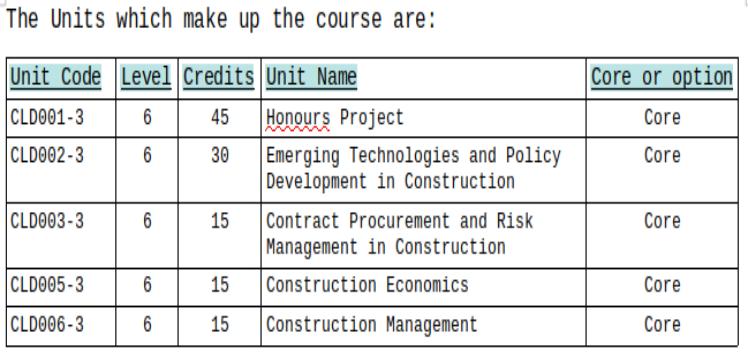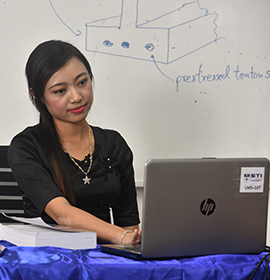BSc (Hons) Construction Management -(3years full-time)

- 🎓 Category : FACULTY OF ENGINEERING
- 🎓 Program : Undergraduate Programs
- 👩🎓 Course Coordinator : Dr. Thein Tan
- This is a franchised Honors program awarded by University of Bedfordshire (UK).
University Of Bedfordshire
About the course
The composition of this course is structured around the key attributes that an effective employee or graduate should have once in industry:
🔨Developed personal skills with both the confidence and ability to express creativity, both individually and as part of a team;
🔨Gained the ability to promote a responsible, professional attitude towards the selection and use of both data and skills, within team based contexts;
🔨Established an in-depth understanding of construction management, and developed a critical awareness of new emerging solutions and technologies;
🔨Developed a comprehensive awareness of the wider cultural, social, political, economic and ethical implications of projects within the construction industry;
🔨Applied appropriate knowledge and skills to a piece of work on construction management through the Honours Project, which reflects the programme being studied.
In addition to the broad aims of the course, the specific qualities built into the curriculum ensure that students will gain a systemic understanding of new developments and application. Students will also develop the capacity to analyse, assess and recommend high-level strategies for materials, structures and methods.
The specific objectives of this course, therefore, are to provide students with the skills and knowledge of key subject areas, which relate to sustainability at operational, tactical and strategic levels for modern building technologies. The course will equip students with:
🔨The aptitude to solve problems within various settings;
🔨The competence to develop concepts and apply them in pragmatic ways;
🔨Advanced analytical skills that can be used within organisations;
🔨A perceptive insight into technology-related issues;
🔨The ability to understand policies within local and global contexts, and the capability to identify emerging legislation;
🔨A good understanding of how the design of a construction project can impact on the success and implementation of that project;
🔨The aptitude to think and plan strategically in the design of construction projects;
🔨A good understanding of the societal implications of emerging technologies in construction;
🔨The aptitude to analyse, synthesise, critique and evaluate various means of building technologies, their deployment and leading-edge ideas.
Method of Assessment
The learning and teaching strategy is focused on the explanation of theoretical concepts, accompanied by tutor-supported practical activity to reinforce understanding. This is accomplished through a combination of lectures, tutorials, moderated discussions/debates, peer group discussions/support, directed practical activity with dedicated online technical support, and a database of reading materials.
This strategy shall often be delivered as combined lectures/discussion/practical research in one session, with academic and demonstrator support. Additionally, there will be self-directed research and work-based practical activity, which can be assisted by the use of teaching packs, online technical indexes, and internet/government publications. The particular form of support will be module specific; however, all are characterised by tutor support and a pragmatic approach to activity.
All teaching sources are available within the BREO Virtual Learning Environment (VLE), which includes references and links, general unit and course information, discussion groups, tests and assessments. The VLE is available outside of the University to enrolled students.
Students entering on the course are already likely to have some experience of using computers and their operation. Therefore the approach to teaching and learning begins with student-centred methods and progresses towards independent learning. As the teaching is centred on students, the course structure aims to build their confidence by providing timely and informative feedback under the guidance of their lecturer/tutor. BSc (Hons) Construction Management (CIF) Page 4 of 17CIF 2016 Project supervision involves regular tutorial contact between groups/individuals and their supervisor. The project is integral to the Honours-nature of student study and is seen, both within the University and outside, as an indication of the overall ability and performance of the student.
A range of assessment methods are used throughout the course. The types of assessment used range from practical work, which assesses the practical application of knowledge and concepts gained in lectures, seminars, and also from learning acquired during self-study, through to presentation and report based assessments. Time controlled in-class tests are also utilised to allow the students to experience and adjust to industry requirements.
Assessment submissions will be made via the BREO VLE online portal. Please note that the system may ‘timeout’ if the period of upload is excessive due to overly-large files. Students are therefore encouraged to submit file sizes of less than 20MB. Should you wish to submit larger files, please leave sufficient time to test the submission/discuss with the Unit tutor, prior to the assessment deadline.
Entry Requirement
Standard:
🔨Standard entry requirements for UK students – http://www.beds.ac.uk/howtoapply/ukugentryreqs
🔨Students from the European Union - http://www.beds.ac.uk/howtoapply/eu/guides
🔨International students - http://www.beds.ac.uk/international/international-applications/how-to-apply
Candidates will typically be progressing from level 5 qualification such as Foundation Degree, HND, NVQ 5, or other equivalent qualifications or through interview by the course coordinator.

Course Fees
25,900,000 MMK (Course Fees may change without prior notice)














